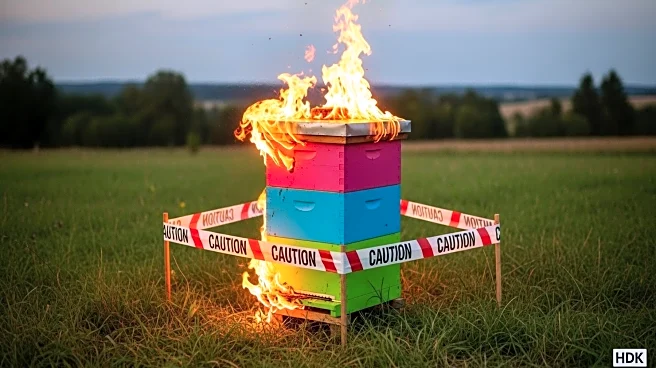What's Happening?
In Almere, Netherlands, a shocking arson attack resulted in the destruction of ten beehives, killing an estimated half a million bees. The incident occurred in Beatrixpark, a scenic area in the city, and has prompted local police to appeal for witnesses. Harold Stringer, the beekeeper affected by the attack, expressed his devastation over the loss, noting that each hive contained between 40,000 to 60,000 bees. The Dutch government has highlighted the vulnerability of bee populations, with over half of the country's 360 bee species at risk of extinction. This attack underscores the ongoing challenges faced by bee populations globally.
Why It's Important?
The arson attack in Almere is significant as it highlights the fragility of bee populations, which are crucial for pollination and maintaining ecological balance. The loss of half a million bees not only impacts local biodiversity but also raises concerns about the broader environmental implications. Bees play a vital role in agriculture, and their decline could affect food production and security. The incident may prompt increased efforts to protect bee habitats and address threats to their survival, emphasizing the need for conservation measures and public awareness.
What's Next?
Following the arson attack, local authorities are likely to intensify their investigation to identify the perpetrators and prevent future incidents. The event may lead to heightened security measures in parks and areas where beekeeping is prevalent. Additionally, there could be increased advocacy for policies supporting bee conservation and habitat protection. The incident may also inspire community initiatives aimed at restoring bee populations and educating the public about the importance of bees to the ecosystem.
Beyond the Headlines
The attack on the beehives in Almere may have deeper implications for environmental ethics and the cultural value placed on biodiversity. It raises questions about human responsibility in safeguarding natural resources and the ethical considerations of harming wildlife. The incident could spark discussions on the cultural significance of bees and their role in folklore and agriculture, potentially influencing public attitudes towards environmental stewardship.









